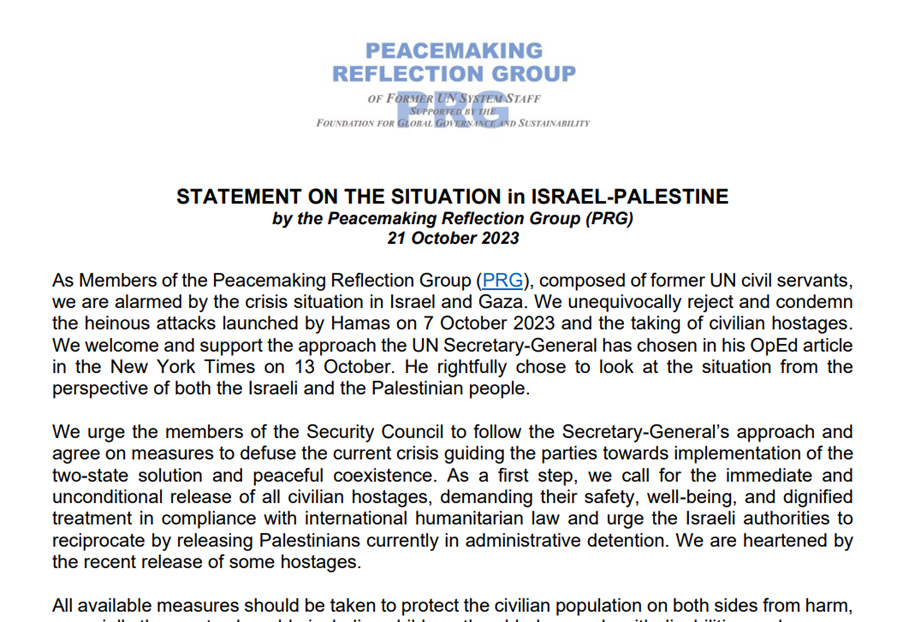As Members of the Peacemaking Reflection Group (PRG), composed of former UN civil servants, we are alarmed by the crisis situation in Israel and Gaza. We unequivocally reject and condemn the heinous attacks launched by Hamas on 7 October 2023 and the taking of civilian hostages. We welcome and support the approach the UN Secretary-General has chosen in his OpEd article in the New York Times on 13 October. He rightfully chose to look at the situation from the perspective of both the Israeli and the Palestinian people.
We urge the members of the Security Council to follow the Secretary-General’s approach and agree on measures to defuse the current crisis guiding the parties towards implementation of the two-state solution and peaceful coexistence. As a first step, we call for the immediate and unconditional release of all civilian hostages, demanding their safety, well-being, and dignified treatment in compliance with international humanitarian law and urge the Israeli authorities to reciprocate by releasing Palestinians currently in administrative detention. We are heartened by the recent release of some hostages.
All available measures should be taken to protect the civilian population on both sides from harm, especially the most vulnerable including children, the elderly, people with disabilities and women. In this regard, we echo the UN Secretary-General’s call for an immediate ceasefire to allow full, rapid, safe and unhindered humanitarian access and cross-border delivery by UN agencies and their implementing partners, the International Committee of the Red Cross (ICRC) and other impartial humanitarian organizations, to the whole of Gaza and affected areas of Israel. We value interventions by world leaders that have opened the door for an initial convoy of humanitarian deliveries and expect their continuation and increase, in proportion to the rapidly mounting needs.
We stand in full solidarity with our UN colleagues working courageously to provide critical, lifesaving assistance and protection to civilians amidst live fire. Their safety, neutrality and operational capacity must be preserved. We urge the international community to increase funding and support for urgently needed relief efforts, including those undertaken by UNRWA, WHO, WFP and ICRC. Their impartial work is vital and must continue without interference.
We recognize the need to understand the complex circumstances driving this conflict. Both Israelis and Palestinians have legitimate grievances stemming from generations of displacement, oppression, marginalization and violence they have suffered. These painful histories do not justify atrocities, but they must be considered in order to facilitate dialogue and reconciliation. Lasting peace cannot be achieved through military force.
Violence causes more violence. As we have observed too many times – and again in this conflict, retaliation predictably leads to further violence and further loss of life. We urge the UN Secretary-General and other well-placed mediators to work with the authorities in Israel and Palestine to rapidly establish methods of violence interruption. As first steps, expressions of hate and all threats of annihilation of one by the other should be condemned and removed from all political discourse. All attacks on civilians should cease from both sides, as should all Israeli settlement activity in the West Bank and East Jerusalem and the arbitrary arrest of Palestinians. These measures can prevent further atrocities and should become an integral part of any international or regional peace process. We welcome the Cairo Peace Summit of 21 October as a first step in that direction. Promoting a culture of peace through robust public education and mass media initiatives to denormalize violence, while pro-actively seeking long-term and mutually acceptable political solutions, is urgently needed to end the Israel-Palestine conflict.
The Peacemaking Reflection Group recognizes that introducing and then pursuing such a balanced approach centred around the well-being and security of all civilians demands a lot of ‘staying power’ by all, in particular the UN Security Council and the UN Secretary-General, along with the leadership of the parties and others involved. It appears to us that the Security Council could still find ways to agree on a combined resolution from among the drafts recently put before it. We strongly encourage efforts by the Secretary-General and his staff to assist the parties to find ways of stopping the current violence and moving towards lasting peaceful coexistence.
21 October 2023


